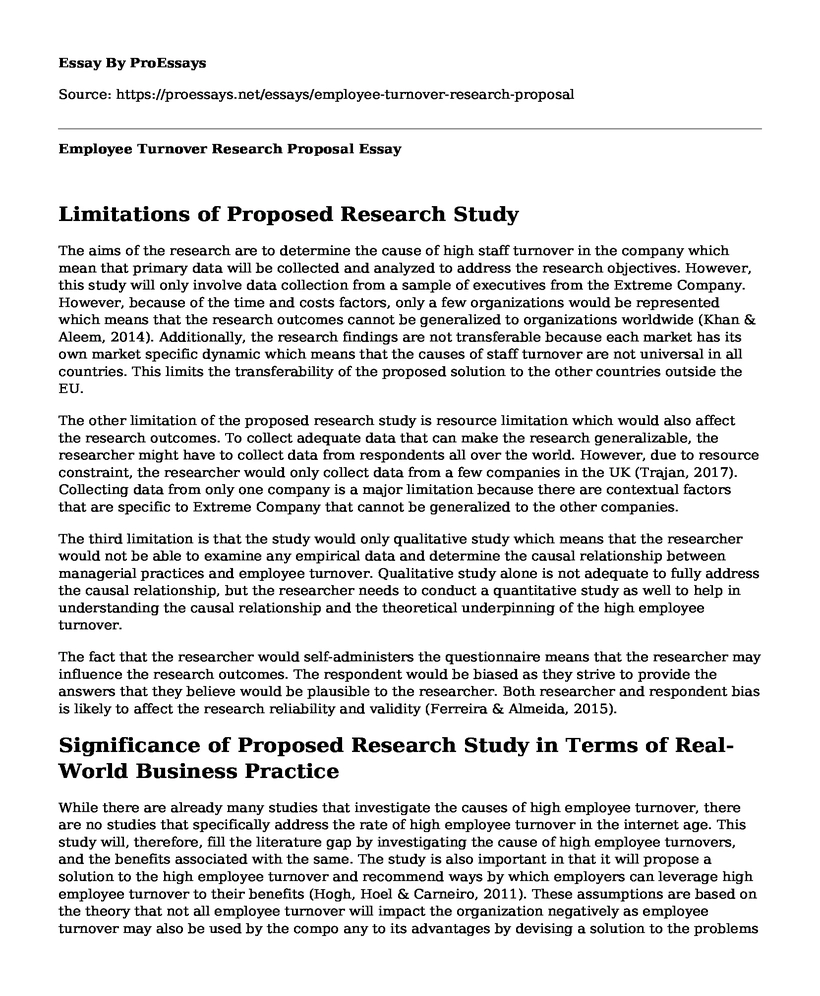Limitations of Proposed Research Study
The aims of the research are to determine the cause of high staff turnover in the company which mean that primary data will be collected and analyzed to address the research objectives. However, this study will only involve data collection from a sample of executives from the Extreme Company. However, because of the time and costs factors, only a few organizations would be represented which means that the research outcomes cannot be generalized to organizations worldwide (Khan & Aleem, 2014). Additionally, the research findings are not transferable because each market has its own market specific dynamic which means that the causes of staff turnover are not universal in all countries. This limits the transferability of the proposed solution to the other countries outside the EU.
The other limitation of the proposed research study is resource limitation which would also affect the research outcomes. To collect adequate data that can make the research generalizable, the researcher might have to collect data from respondents all over the world. However, due to resource constraint, the researcher would only collect data from a few companies in the UK (Trajan, 2017). Collecting data from only one company is a major limitation because there are contextual factors that are specific to Extreme Company that cannot be generalized to the other companies.
The third limitation is that the study would only qualitative study which means that the researcher would not be able to examine any empirical data and determine the causal relationship between managerial practices and employee turnover. Qualitative study alone is not adequate to fully address the causal relationship, but the researcher needs to conduct a quantitative study as well to help in understanding the causal relationship and the theoretical underpinning of the high employee turnover.
The fact that the researcher would self-administers the questionnaire means that the researcher may influence the research outcomes. The respondent would be biased as they strive to provide the answers that they believe would be plausible to the researcher. Both researcher and respondent bias is likely to affect the research reliability and validity (Ferreira & Almeida, 2015).
Significance of Proposed Research Study in Terms of Real-World Business Practice
While there are already many studies that investigate the causes of high employee turnover, there are no studies that specifically address the rate of high employee turnover in the internet age. This study will, therefore, fill the literature gap by investigating the cause of high employee turnovers, and the benefits associated with the same. The study is also important in that it will propose a solution to the high employee turnover and recommend ways by which employers can leverage high employee turnover to their benefits (Hogh, Hoel & Carneiro, 2011). These assumptions are based on the theory that not all employee turnover will impact the organization negatively as employee turnover may also be used by the compo any to its advantages by devising a solution to the problems or viewing the problems from a different perspective (Khan & Aleem, 2014). The study would be an important foundation for future studies on the employee turnover. The researcher would provide a unique perspective to the already established theories thereby initiating discourses on the causes and effects of employee turn. For example, the researcher believes that employee turn cannot only be a positive signal for problems in the company's managerial practices but also a better motivation for employee management policy review and amendments.
References
Ferreira, L., & Almeida, C. (2015). Employee Turnover and Organizational Performance: a Study of the Brazilian Retail Sector. Brazilian Business Review, 12(4), 27-56. doi: 10.15728/bbr.2015.12.4.2
Hogh, A., Hoel, H., & Carneiro, I. (2011). Bullying and employee turnover among healthcare workers: a three-wave prospective study. Journal Of Nursing Management, 19(6), 742-751. doi: 10.1111/j.1365-2834.2011.01264.x
Khan, A., & Aleem, M. (2014). Impact of job satisfaction on employee turnover: an empirical study of autonomous medical institutions of Pakistan. Journal Of International Studies, 7(1), 122-132. doi: 10.14254/2071-8330.2014/7-1/11
Rajapaksha, U. (2015). A Study on the Impact of Recruitment Methods on Employee Turnover (Reference to Banking Sector in Sri Lanka). SSRN Electronic Journal. doi: 10.2139/ssrn.2699788
Trajan, D. (2017). Employee Turnover and Employee Performance: A Comparative Study among Nurses. MOJ Applied Bionics And Biomechanics, 1(5). doi: 10.15406/mojabb.2017.01.00025
Cite this page
Employee Turnover Research Proposal. (2022, Jul 25). Retrieved from https://proessays.net/essays/employee-turnover-research-proposal
If you are the original author of this essay and no longer wish to have it published on the ProEssays website, please click below to request its removal:
- Course Feedback
- Argumentative Essay: A Leader Is Best Judged by the Well-Being of the People in His Country
- The Concept of the Imperial Mode of Living Essay
- Deployment of Open Standards in the Public Administration Article Review Paper Example
- Exploring Different Theories of Employee Wellbeing - Paper Example
- Essay Example on Consumer Protection: Safeguarding Public from Unfair Practices
- University Crisis Communication Plan: A Guide for Officials Paper







